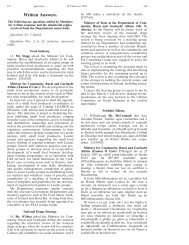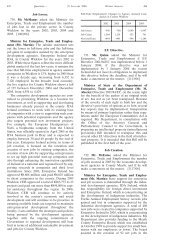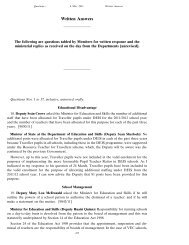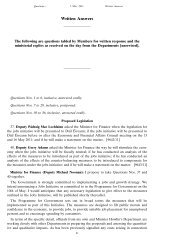Written Answers. - Parliamentary Debates - Houses of the Oireachtas
Written Answers. - Parliamentary Debates - Houses of the Oireachtas
Written Answers. - Parliamentary Debates - Houses of the Oireachtas
You also want an ePaper? Increase the reach of your titles
YUMPU automatically turns print PDFs into web optimized ePapers that Google loves.
Questions— 14 February 2012. <strong>Written</strong> <strong>Answers</strong><br />
Minister for Social Protection (Deputy Joan Burton): Self-employed persons are liable for<br />
PRSI at <strong>the</strong> Class S rate <strong>of</strong> 4%, which entitles <strong>the</strong>m to access long-term benefits such as State<br />
pension (contributory) and widow’s, widower’s or surviving civil partner’s pension<br />
(contributory). Ordinary employees who have access to <strong>the</strong> full range <strong>of</strong> social insurance<br />
benefits pay Class A PRSI at <strong>the</strong> rate <strong>of</strong> 4%. In addition, <strong>the</strong>ir employers make a PRSI contribution<br />
<strong>of</strong> 10.75% in respect <strong>of</strong> <strong>the</strong>ir employees, resulting in <strong>the</strong> payment <strong>of</strong> a combined 14.75%<br />
rate per employee under full-rate PRSI Class A. (For employees earning less than €356 per<br />
week, <strong>the</strong> rate <strong>of</strong> employer’s PRSI is 4.25%).<br />
Any changes to <strong>the</strong> PRSI system to extend <strong>the</strong> full range <strong>of</strong> social insurance benefits, including<br />
illness benefit, to self-employed persons would have significant financial implications and<br />
would have to be considered in <strong>the</strong> context <strong>of</strong> a much more significant rise in <strong>the</strong> rate <strong>of</strong><br />
contribution payable. I established <strong>the</strong> Advisory Group on Tax and Social Welfare last year to<br />
meet <strong>the</strong> commitment made in <strong>the</strong> Programme for Government. The Advisory Group will,<br />
inter alia, examine and report on issues involved in providing social insurance cover for selfemployed<br />
persons in order to establish whe<strong>the</strong>r or not such cover is technically feasible and<br />
financially sustainable. In addition, <strong>the</strong> Actuarial Review <strong>of</strong> <strong>the</strong> Social Insurance Fund, which<br />
is due to be completed in mid-2012, will examine this matter.<br />
Self-employed individuals may establish entitlement to assistance-based payments such as<br />
Disability Allowance. Disability Allowance is a weekly payment made to persons with a disability<br />
whose employment capacity is substantially restricted by reason <strong>of</strong> <strong>the</strong>ir disability and<br />
whose means are insufficient to meet <strong>the</strong>ir own needs and those <strong>of</strong> <strong>the</strong>ir dependents. As well<br />
as providing income support for people with disabilities, incentives towards employment and<br />
training are also a key feature <strong>of</strong> Disability Allowance. An income disregard for earnings from<br />
rehabilitative employment provides that all earnings up to €120 per week are disregarded as<br />
means when assessing entitlement, while income between €120 and €350 is assessed on <strong>the</strong><br />
basis <strong>of</strong> 50 cents for every euro earned.<br />
365. Deputy Willie Penrose asked <strong>the</strong> Minister for Social Protection <strong>the</strong> number <strong>of</strong> hours<br />
persons, who are in receipt <strong>of</strong> social welfare, can work on a weekly basis where such persons<br />
might have to do <strong>the</strong> same for rehabilitate purposes or which might arise due to part time work<br />
becoming available and whereby <strong>the</strong>y still can receive <strong>the</strong>ir specific social welfare payment;<br />
and if she will make a statement on <strong>the</strong> matter. [8468/12]<br />
Minister for Social Protection (Deputy Joan Burton): Where a person is in receipt <strong>of</strong> a<br />
disability allowance payment, s/he may take up employment <strong>of</strong> a rehabilitative nature, subject<br />
to <strong>the</strong> approval <strong>of</strong> <strong>the</strong> Department. There is no limitation on <strong>the</strong> number <strong>of</strong> hours <strong>the</strong>y may<br />
work in such circumstances. Any earnings up to €120 per week will be disregarded in <strong>the</strong><br />
means-test for <strong>the</strong> disability allowance payment, while earnings above that threshold will be<br />
assessed at 50%.<br />
Hi<strong>the</strong>rto, where a person was in receipt <strong>of</strong> a social insurance based invalidity pension, or<br />
long-term illness benefit, s/he could apply for an exemption to take up rehabilitative employment<br />
which did not exceed 20 hours per week. With effect from 13 February 2012, a new<br />
scheme has been introduced which <strong>of</strong>fers a more flexible long-term support to claimants <strong>of</strong><br />
invalidity pension or long-term illness benefit. The partial capacity benefit scheme will provide<br />
an opportunity for people with disabilities to have <strong>the</strong>ir capacity for work assessed and to<br />
receive an ongoing income support payment based on this assessment. Any increase being paid<br />
in respect <strong>of</strong> a qualified adult or qualified children will not be affected.<br />
The scheme is open to people who are in receipt <strong>of</strong> invalidity pension or who have been in<br />
receipt <strong>of</strong> illness benefit for a minimum <strong>of</strong> six months. Participation in <strong>the</strong> scheme is voluntary<br />
482











![[Deputy Michael Noonan.]](https://img.yumpu.com/30494839/1/190x245/deputy-michael-noonan.jpg?quality=85)




